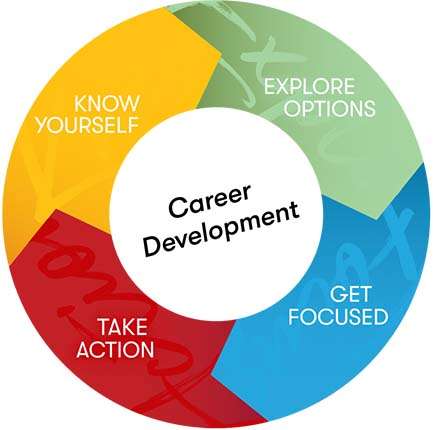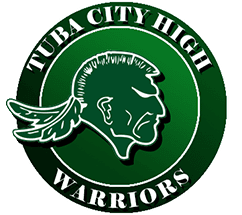Tuba City High School TCHS Counseling
Debbie Yellowman
Ext.1119
Elouise Graham
Ext.1121
Cheryl Onsae-Scott
Ext.1164
Dr. Anslem Yazzie
Ext. 1161
Develop Your Plan
The Future Begins Right Now
What is ECAP?
Career Planning Links
College Planning - Checklist for Freshmen
College Planning - Checklist for Juniors
College Planning - Checklist for Sophomores
College Planning - Checklist for Seniors

ECAP: What is it?
ECAP stands for “Education and Career Action Plan” and is a graduation requirement for all students in the state of Arizona. An ECAP reflects a student’s current plan of coursework, career aspirations, and extended learning opportunities in order to develop the student’s individual academic and career goals.
A student’s plan helps to personalize education through their interests, their skills, and their aspirations as they pursue and refine their post-secondary goals. Students, parents, and school personnel (i.e. counselors, teachers, administration, etc.) can work together to help guide the students. Here at Tuba CIty High School, students focus on their ECAP during “Advisory” period twice a week.

Career Planning Links
-
AZCIS
Arizona Career Information System
-
Interested in Joining the Military?
THE U.S Military consists of 5 service branches: Army, Marine Corps, Navy, Air Force and Coast Guard. This downloadable PDF file will provide you with information to help with your decision.
-
Military.com
Read about the involvement of the U.S. Military throughout the world. Does this information found on the Military website inspire you?
-
Occupational Outlook Handbook
Pertinent information for all occupations. Learn median wages and education levels needed to obtain that dream career.
Career Planning: Checklist for Freshmen
-
August
- Make a point to meet your Academic Counselor and continue to visit throughout the school year.
- College-bound students: Make sure you have a 4 year plan when registering for high school
- Recommendation: Take more courses of English, science, math, computer science and vocational classes.
- Consult with your counselor to ensure college-bound track.
- Get familiar with ECAP (Education Career Action Plan)
-
September
- Become aware of your grade point average (GPA). It will accumulate on your school transcripts until you graduate from high school.
- Set your educational goals.
- Learn and apply study skills from classes/workshops. A MUST!
- Learn to manage your time wisely
- Explore various careers through library research, talking to others, and checking up on CAREER DAYS and COLLEGE DAYS.
- Talk to your counselor about careers and educational opportunities.
- Keep up good grades. If you start having trouble with classes, get in touch with your counselor and arrange for tutoring.
- Get involved with clubs and extracurricular activities, but maintain those good grades!
- Read as much as you can!
- Utilize http://www.azcis.intocareers.org
- Get grades up for first 9 weeks.
-
October
- Continue to read!
- Attend College Fair!
- Become familiar with high school graduation requirements.
- Become familiar with classes available here at TCHS including Dual-Enrollment, AP Courses and Honors courses.
- Create and complete a 4 year plan.
-
December
- Use the internet to explore career options.
- STUDY FOR FINAL EXAMS.
-
January
- Talk to people with occupations that interest you.
- Attend any and ALL Career Fairs.
- Start checking into summer enrichment programs (Nizhoni Academy, Upward Bound and Four Corners Math/Science. Know the deadlines!
-
May
- Sign up for College Day presentations.
- Meet with your counselor periodically to discuss your grads, academic programs and educational goals.
- Plan on taking the preliminary Scholastic Achievement Test/National Merit Scholarship Qualifying Test (PSAT/NMSQT), the Armed Forces Vocational Aptitude Battery (ASVAB), and the Preliminary American College Testing (PLAN) in your 10th grade year
- STUDY FOR FINAL EXAMS
- Attend summer school
-
June
- Attend summer school if need to.
- Volunteer for summer jobs/activities that will provide you with exposure and experience in career fields that interest you.
- Attend summer-enrichment programs,
- Remember: It’s not too early to start your college career!
- STUDY FOR FINALS!
Career Planning: Checklist for Juniors
-
September
- Talk to your school counselor or Educational Talent/Upward Bound counselor about career and educational opportunities.
- Start planning for college. Familiarize yourself with the Scholastic Aptitude testing (SAT), American College Testing (ACT), Preliminary Scholastic Aptitude Test/National Merit Scholarship Qualifying Test (PSAT/NMSQT), College Scholarship Service (CSS) and Free Application for Federal Student Aid (FASFA). Look through college catalogs and general guides, e.g., The College Handbook. Use computerized career and educational programs and the internet to explore all options. (AZCIS)
- Request at least three college admission applications and college catalogs.
- Register for the PSAT/NMSQT tests.
- Study for these tests. Take test preparation classes.
- Send for you Certificate of Indian Blood (CIB) if applicable.
- Attend career fairs and college fairs.
- Get involved in clubs and extracurricular activities (as long as you maintain good grades).
- Apply for your Social Security Number (SNN), if you haven’t already done so.
-
October
- Take the PSAT/NMSQT and ASVAB tests.
- Check out scholarships available at the college(s) of your choice. See what criteria you need to meet in order to apply.
- Study school catalogs/pamphlets.
- Continue meeting with your counselor.
- Attend College Night and/or college fairs and meet with representatives.
-
November
- Study for tests and/or attend classes/workshops that are offered.
-
December
- Study for finals.
- Discuss your ASVAB test results with your school counselor.
-
January
- If you have not received your CIB or SNN, follow up on your request(s).
- Check into/apply for summer enrichment programs (Nizhoni Academy, Upward Bound, Four Corners Math/Science). KNOW DEADLINES!
- Talk to people in occupations that interest you.
- Discuss PSAT/NMSQT and/or PLAN assessment tests.
- Meet with your counselor periodically to discuss your grades, academic progress, and educational goals.
- Attend any CAREER FAIRS.
-
March
- Sign up for the ACT and/or SAT tests
-
April
- Take ACT/SAT tests.
-
May
- Talk to your counselor about test results.
- Request information on scholarships, housing, etc. from colleges.
- Keep all information in one packet or folder. Write down dates, names, addresses, and phone numbers of individuals you have contacted (and what was said).
- You may take the ACT or SAT, if you need to re-take the test to improve your scores, you must do so at the beginning of your senior year.
-
June
- Attend summer school if need to.
- Attend summer enrichment programs.
- Volunteer.
-
Summer Months
- Send out school applications.
- Check on your status of school applications.
- Pick up several copies of your CIB
- Request letters of recommendation from your teachers, counselors, and supervisors.
- If you are gathering information during the summer, your senior year will be less hectic. Gather the things you will need for post-secondary education admission and financial aid.
- Visit college campuses.
- Work to help pay for college costs.
Career Planning: Checklist for Sophomores
-
September
- Make a point to meet your Academic Counselor and continue to visit throughout the year.
- Make sure you take or plan to take the appropriate course to get into college.
- Learn more about the Armed Services Vocational Aptitude Battery (ASVAB) test.
- Explore various careers by library research, internet research, talking to others, and checking on dates for CAREER DAYS and COLLEGE DAYS.
- Talk to your counselor about careers and educational opportunities.
- Keep up good grades. If you start to have trouble with classes, talk to your counselor and arrange tutoring assistance.
- Get involved with clubs and extracurricular activities but maintain good grades.
- Familiarize yourself with preliminary admissions tests (PSAT/NMSQT and PLAN).
- Familiarize yourself with requirements for the 10th grade on the AZCIS and ECAP.
-
October
- Register for the preliminary admissions tests; Preliminary Scholastic Aptitude Test/National Merit Scholarship Qualifying Test (PSAT/NMSQT) and the Preliminary American College Testing (PLAN)
- The PLAN test is recommended to be taken in your sophomore year.
- Take a preparatory class for these tests.
- Study for these tests.
-
November
- Use the AZCIS Interest Inventory or other career and guides to explore more occupations. (Career Cluster Inventory, IDEAS, Interest Profiler)
- If you’re interested in the military or military academy, check procedural requirements.
- Register to preliminary admissions tests: PSAT/NMSQT, and PLAN assessment.
-
December
- Take PSAT/NMSQT and/or PLAN assessment tests.
- Study for finals!
-
January
- Discuss PSAT/NMSQT and/or PLAN test results with your counselor.
- Start checking into summer enrichment-programs. (Nizhoni Academy, Upward Bound, Four Corners Math/Science) Know deadline dates!
- Meet with your counselor periodically to discuss your grades, academic progress and educational goals.
-
May
- Talk to people in occupations that interest you
- Attend CAREER FAIRS!
- Sign up for COLLEGE DAY presentations.
- Start exploring your college choices.
- Remember: It’s not to early to start planning your college career.
- Sign up for summer school.
-
June
- Attend summer school if needed.
- Attend summer enrichment programs.
- Volunteer.
Career Planning: Checklist for Seniors
-
September
- Establish contact with counselor. Meet with them monthly.
- Familiarize yourself with the American College Testing (ACT) and the Scholastic Aptitude Testing (SAT).
- Send out at least three school applications and official transcripts and know deadlines for all applications. Record deadlines on your calendar.
- Keep a record of whom you talked to, the date, and what it was about. Also, make copies of all documents you send out. Keep it all in one file folder.
- Register for the ACT and/or SAT tests. October is the best time to take these tests.
- Study for these tests. Many high schools sponsor workshops to assist students in their preparation.
- Request three (3) Certificates of Indian Blood (CIB), if applicable.
-
October
- Take the ACT and/or SAT tests.
- Study school catalogs/pamphlets.
- Check out scholarships available at the college(s) of your choice.
- Ask teachers, counselors and others for letters of recommendation.
- Check housing/deposit deadlines.
- Attend career college fairs and find out about college visitation days.
-
November
- Register for the ACT and/or SAT tests (if you haven’t already done so).
- Send out more school applications (if needed).
- Males 18 or older: register for Selective Service.
- If you haven’t heard back within a reasonable timeframe, make a follow-up phone call. Keep track of all calls & correspondence.
- Work on scholarship essays, requirements, etc. Check out deadlines…don’t miss them.
-
December
- Retake the ACT and or SAT tests (if necessary).
- Work on resume.
- Follow up on status of school applications.
- Check into College Scholarship Service (CSS) and Free Application for Federal Student Aid (FAFSA)
-
January
- Encourage your parents to complete their Income Tax Returns.
- Gather supporting documents for completion of financial aid forms.
- Begin financial aid and Tribal Scholarships application process – Mail financial aid applications as soon as possible!
- Start filling out tribal scholarship applications.
- Sign up for ACT and/or SAT tests (if you haven’t already done so).
- Check into transition programs, freshman orientation, and know the deadlines for all applications!
-
February
- Make sure those financial aid applications are mailed.
- Take/Retake the ACT and/or SAT tests.
- Double check on school applications. You need an official letter of acceptance.
- Send in housing application/deposits before deadlines.
- Find out if the schools offer any special programs geared for you: bridge programs, Freshman Year Experiences, etc. What do you need to do to apply for these programs?
-
March
- Check again on status of admission, financial aid, housing, CIB and tribal application.
- Check to see if/when there is a pre-registration. Pre-registering will save you time and will help you get the classes you want.
- Make sure that all scholarship information is complete and sent in before deadlines.
- If there are any mistakes/errors or incomplete information on financial aid packages, correct them and send back ASAP!
- Check housing/deposit deadlines.
-
April
- If you applied for any scholarships, you should be hearing from them sometime this month (if everything was completed as requested).
- Make sure your ACT/SAT scores, admissions, housing, financial aid, tribal grants, and scholarship applications have been received at your designated schools.
- Compare schools and their programs, financial aid packages, specialized programs, etc., and make your selection (if you haven’t already done so). Inform the schools of your choice.
-
May
- Check on visitations available at schools for both you and your parents, e.g., Previews or orientation.
- Make sure your final transcript is being sent to the college of your choice and tribal scholarship office.
- You should have received an Award Letter and Financial Need Analysis (FNA) from your college’s financial aid office.
- Check to make sure the school financial aid office sent a copy of your FNA to the tribal scholarship office.
- If everything is not completed, continue to make phone calls and/or write letters.
- Everything should be finished this month. You should be admitted, have a housing assignment and financial aid/scholarship award letter. All you need to do now is register for your classes. Congratulations!
-
June
- Attend Freshman orientation, and/or transition programs.
- Continue to follow up on status of financial aid admissions, housing applications and/or tribal funding.
Your questions answered
Arizona Public University Admission Requirements
4 Years
- English
- Math: Algebra 1, Geometry II, and Advanced Math for which Algebra II is a prerequisite.
3 Years
- Lab Sciences: Integrated Lab Science, Biology, Earth Science, Chemistry or Physics, Anatomy.
2 Years
- Social Studies: including U.S. History and U.S. Government.
- Foreign/Indigenous Language: Two units of the same language.
1 Year
- Fine Arts
Additional Requirements
Ranking: You must rank in the upper 25% of your high school graduating class or have an overall high school grade point average of at least 2.5 on a 4.0 scale.
OR
ACT Score: Achieve a minimum composite score of 21 (in-state applicant) or 23 (out-of-state applicant).
OR
SAT Score: Achieve a minimum compostite score of 1010 (in-state applicant) or 1040 (out-of-state applicant).
Arizona Junior Colleges & Technical Schools
- A high school diploma or GED (Graduation Equivalency Degree) is r additional information.required. Contact individual schools for additional information.
Tribal Resources
School of your choice:
Admission Application
High School Transcript
Housing Application/Deposit
Financial Aid Information
Tribal Assistance:
Tribal Application
Certificate of Indian Blood
HS Transcript
Letter of Acceptance
Financial Need Analysis
Financial Aid:
FAFSA
Income Tax Returns
Educational Statement
Selective Service Registration (male)
Scholarship:
Rules/guideline eligibility
Essay
Letters of Recommendation
Check deadlines
Navajo Scholarship Office
PO Box 1870
Window Rock, AZ 86515-1870
(928) 871-7640/7435 – direct
(800) 243-2956 – Arizona
(928) 871-6561 – Fax
Hopi Grants & Scholarship Office
PO Box 123
Kykotsmovi, AZ 86039
(928) 723-2441, Ext. 533/522/521
(800) 762-9630
White Mountain Apache Tribe
Scholarship Office
PO Box 999
Whiteriver, AZ 85941
(928) 338-4490
San Carlos Scholarship Office
PO Box 0
San Carlos, AZ 85550
(928) 475-2336
Scholarship & Information Sites
- AISES – American Indian Science and Engineering Society
- American Indian College Fund
- Arizona Foundation
- Chief Manuelito Scholarship
- Coconino Community College – External Scholarship
- College Depot
- Fastweb
- Federal Student Aid
- Free Application for Federal Student Aid (FAFSA)
- Going Merry
- Hopi Education Endowment Fund
- Native American/Minority Scholarship Website
- Navajo – Local Chapter House
- Navajo Nation Scholarship
- Personal Identification Number
- Scholarships.com
Chief Manuelito Scholarship
The Chief Manuelito Scholarship was established in 1980 to provide scholarships to high achieving Navajo high school graduates. Scholarships are awarded based on ACT/SAT test scores and final high school grade point average. The policies concerning deadlines and document submittal are strictly adhered to by the program. Students receive $7000 annually to cover direct educational expenses associated with colleges and universities. High school graduates must meet the following 2 criteria for eligibility.
- High school graduate admitted to a post-secondary institution with a minimum ACT (SAT scores will be converted) composite score in combination with a minimum grade point average, and
- Completion of required Navajo language and Navajo Government courses prior to high school graduation date.
24/3 Rule
The Chief Manuelito Scholarship also recognizes and awards undergraduate college students with superior academic ability upon availability of funds and upon meeting eligibility criteria:
♦ A Full-time undergraduate student, having completed twenty four (24) semester credit hours, or equivalent amount of quarter or trimester credit hours, with a 3.00 cumulative grade point average (GPA) based on college-level grades courses. Because this scholarship is based on the GPA of college level courses, students seeking an Associate of Applied Science (AAS) or Certificate are not eligible.
ONNSFA Chinle Agency
PO Box 25-B
Tsaile, AZ. 86556
Toll Free:(800) 919-9269
Fax:(928) 724-2208
ONNSFA Crownpoint Agency
PO Box 1080
Crownpoint, NM 87313
Toll Free:(866) 254-9913
Fax:(505) 786-2178
ONNSFA Ft. Defiance Agency
PO Box 1870
Window Rock, AZ 86515
Toll Free:(800) 243-2956
Fax:(928) 871-6561
ONNSFA Shiprock Agency
PO Box 1349
Shiprock, NM 87420
Toll Free:(866) 223-6457
Fax:(505) 368-1338
ONNSFA Tuba City Agency
PO Box 370
Tuba City AZ 86045
Toll Free:(866) 839-8151
Fax:(928) 283-3215
Summer Programs
College Goal - FAFSA Information
Tuba City High School Notices
This notice area is intended to keep families up-to-date with school closures or events that affect your students attendance. Please check here regularly for updates.



 Tuba City High School
Tuba City High School